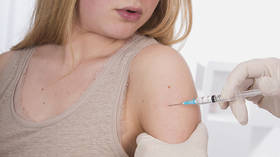Wait! US & UK doctors warn against hormones/surgery for trans-identified kids

Medical professionals in the US and UK are sounding the alarm about the growing use of “hormonal and surgical interventions” for children who are confused about their gender identity, saying that more studies are required.
Members of the conservative childrens’ advocacy group the American College of Pediatricians (ACP) wrote a letter on Monday to the Surgeon General of the United States, warning about the effects of gender-reassignment surgeries and hormonal drugs on minors, saying such interventions have “not undergone long-term study.”
The ACP called the issue a “grave public health concern” and said that the drastic methods have become the new “standard of care” in lieu of “ethical psychotherapy” for children and teens who present with gender dysphoria (GD).
Also on rt.com ‘Experiment on kids’: Cross-sex hormone therapy age down to 8 in US govt-funded study, doctor findsThe ACP letter cites research which claims that 61-98 percent of youth affected by GD will “outgrow” it “if allowed to progress through natural puberty.”
The group also laments that healthcare professionals are “increasingly prohibited from investigating psychosocial factors” which may have led to GD symptoms and fear being penalized or accused of discrimination.
Dual warnings
The warnings are coming from both sides of the pond. Earlier this month, the Royal College of General Practitioners (RCGP) cautioned that there is a lack of “robust evidence” about the long-term effects of puberty-blockers and hormonal drugs.
In a 12-page position paper, the RCGP complained that family doctors were under pressure to provide gender dysphoria services that “lie outside the remit” of their generalist expertise. The paper advises that more research is needed on the pros and cons of medical treatment vs. a less dramatic “wait and see” approach.
Also on rt.com A girl at mom’s, a boy at dad’s: ‘Transgender’ Texas child caught in custody battleMedical treatment of children with GD often begins with the prescription of puberty blockers, which are given to halt normal onset of puberty. Next, the child is given “cross-sex hormones” – in other words, hormones which match their stated identity rather than their biologically assigned sex. At a later stage, the patients undergo gender-reassignment surgery.
The side-effects of these interventions can include “sterility, sexual dysfunction, surgical complications, thromboembolic and cardiovascular disease, osteoporosis, malignancy, and persistently elevated rates of suicide,” the ACP advises.
‘Surge’ of GD in girls
The medical warnings come as the UK’s only child gender clinic, the Gender Identity Development Service (GIDS), reported significant increases in the numbers of children seeking to transition to the opposite gender – an overwhelming majority of them (74 percent) being young girls seeking to transition to a male identity.
The Sunday Times reported on the “surge” last month, noting that the majority (54 percent) of the children referred to the clinic are 14 or under. In the UK, 17 year-olds are now allowed to be seen in adult gender clinics and to independently consent to treatment. The newspaper also recalled that a “review” into the new wave of girls seeking to transition had been ordered by the former equalities minister Penny Mordaunt last year, but “little has been heard of it since.”
While transgender rights activists argue that the huge increases are due to growing public acceptance of a previously taboo issue, skeptics say that impressionable children are being confused by activists who ‘promote’ the idea of changing genders and who pressure health professionals to immediately accept a child’s assertion that he or she is the opposite sex, rather than first exploring psychological reasons why a child may feel that way.
Patients are told blockers are "fully reversible." Entwistle says: “no one knows what the impacts are on children’s brains, so how is it possible to make this claim?” "In practice, nearly all those given the drugs go on to take irreversible sex-change hormones once they turn 16."
— TransgenderTrend (@Transgendertrd) July 21, 2019
Whistleblower
The RCGP warning was shortly followed by claims from a National Health Service (NHS) psychologist who said poor and potentially abused children are being misdiagnosed as transgender. Dr Kirsty Entwistle, a former GIDS worker, said children can present with GD due to “traumatic early experiences,” including sexual abuse, but those cases are not being investigated properly because medical professionals fear being labeled “transphobic.”
Entwistle said she left GIDS after being accused of transphobia herself, after raising concerns over the skyrocketing numbers of young people identifying as transgender. She also claims that GIDS staff tell parents of children that the effects of puberty blockers are “fully reversible” despite a lack of evidence on the effect the drugs have on children’s brains.
The BBC reported on Monday that GIDS lowered the age it offered kids puberty blockers based on a study which is being investigated by the Health Research Authority. The drugs, which are given to children as young as 11 years-old in Britain, could be linked to increases in suicidal thoughts.
De-transitioning?
Some recent reporting has also explored the phenomenon of the "detransitioners"; individuals who believed themselves to be transgender before changing their minds and deciding to transition back to their original biological gender. The detransitioners are thought to make up a very small number of the adult trans population.
But the story seems to be different for children. A study in the Journal of the American Academy of Child and Adolescent Psychiatry found that two-thirds of adolescent patients at a clinic in Amsterdam ended up identifying as their original birth-assigned gender. Another study, often called into question by trans activists, found that up to 80 percent of trans kids eventually identified as their birth sex. Canadian sex researcher James Cantor wrote in a blog post in 2016 that “only very few trans-kids still want to transition by the time they are adults.”
Instead, he claimed, “they generally turn out to be regular gay or lesbian folks.”
Think your friends would be interested? Share this story!















